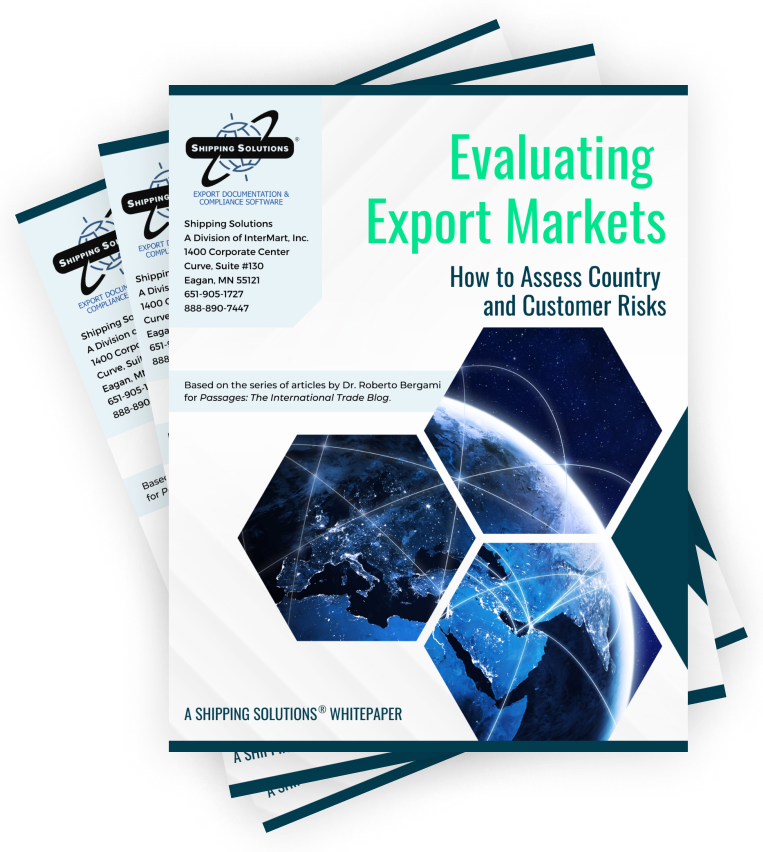The International Trade Blog International Sales & Marketing
Import-Export Due Diligence: Measuring Corruption
On: September 20, 2023 | By:  Roberto Bergami |
4 min. read
Roberto Bergami |
4 min. read
 This is the second part in my series of articles on assessing country and customer risk.
This is the second part in my series of articles on assessing country and customer risk.
In my first article, I explained why it is important to classify both countries and customers. A rogue customer in a good (from a risk perspective) country is not a much better risk than a good customer in a rogue (from a risk perspective) country.
In this article I will concentrate on measuring the level of corruption in your current or potential foreign markets.
Bribery and Corruption
Bribery and corruption are a significant world problem. The lack of transparency is a huge problem for business. Successful business relationships are based on predictability of outcomes. The seller expects the buyer to be fair about accepting goods and making timely payment, and conversely, the buyer expects the seller to deliver goods on time.
Where bribery and corruption exist, these processes are distorted and predictability is lost. Instead of orderly business conduct, we witness chaos and, at times, outright intimidation.
Transparency International (TI) is an organization that is dedicated to fighting corruption. Their website has a wealth of information about corruption around the world.
TI regularly publishes data about corruption in a number of publications available for download free of charge. One of the most important of these publications, in the context of this series of articles, is the Corruption Perceptions Index (CPI) that is published annually.
In the 2023 CPI, 180 countries were classified according their corruption perception. The classification is done on the basis of 0 to 100 points—the lower the score the higher the corruption, and vice-versa. In the most current report, Denmark, Finland and New Zealand are listed as the least corrupt countries, while South Sudan, Syria, Venezuela and Somalia are the most corrupt. The United States is currently listed as the 24th least corrupt nation.
The reader is encouraged to view the publication, especially the chart that provides a summary of the nations around the world and their corruption status; quite a visual impact. The data in this chart may provide some interesting disclosures.
Managing Risk through Transparency
The significance of transparency cannot be underestimated. A country with high levels of corruption may be likened to a patient with a severe illness. Left unchecked and untreated, that illness is likely to progress to a terminal sickness that will ultimately see the patient lose their life.
In much the same way, corruption in a country, left unchecked and untreated, is likely to curtail business opportunities and economic development in that particular country. Usually in highly corrupt countries the majority of the population is oppressed, lacks basic freedoms, and is typically quite poor while the rulers enjoy extraordinary comforts.
Under such circumstances it becomes difficult to conduct ordinary legal business transactions. Often facilitation payments are demanded by local bureaucrats who will otherwise be able to magically interpret whatever rules are in place to your detriment. Of course, if you do become a party to facilitations payments, how do you put a stop to it in the future? This becomes tantamount to blackmail.
In as much as anything else, these considerations bring to question one's ethics and the degree to which these ethics are adhered to. Whilst the question and definition of ethics is always difficult, one thing is for sure: if it is illegal, it is also unethical.
The Foreign Corrupt Practices Act (FCPA)
Corrupt practices (and being part of these as a foreigner) are illegal in most developed countries, and there are also penalties in the host countries for activities conducted abroad. U.S. exporters should read: The Foreign Corrupt Practices Act article.
For example a seller in country A engages, or becomes a party to, corrupt practices in country B. The seller may be in breach of both local laws in country B as well as laws in country A (home country). This situation is best avoided at the onset. If corrupt practices are required to gain business, it is always best to walk away from the deal.
The benefit of analyzing the TI website and reading through their publications is that an entrepreneur has the opportunity to become familiar with likely business practices in the foreign country. As the old saying goes: forewarned is forearmed.
The data from TI needs to be put into perspective with events that may occur between one publication and the next; at times 12-month periods. Changes in political leadership or a change of philosophy from current political leaders do occur. However, it is always prudent to keep a close watch to see whether the words match the actions—after all, words are cheap. Investigating the presence or absence of corruption is the first step in analyzing country risk.
I'll introduce another set of data to be considered in my next article.
Like what you read? Join thousands of exporters and importers who subscribe to Passages: The International Trade Blog. You'll get the latest news and tips for exporters and importers delivered right to your inbox.
This article was first published in April 2013 and has been updated to include current information, links and formatting.

About the Author: Roberto Bergami
A full time member of staff at Victoria University, Melbourne, Australia, since 1998, Roberto holds a PhD (Thesis title Risk Management in Australian Manufacturing Exports: the Case of Letter of Credit to ASEAN), a Master in Education and Master of Business by Research (Applied Economics). Roberto additionally holds the Certified Documentary Credit Specialist qualification.
He is currently a Senior Lecturer in the College of Business and Visiting Professor at the University of South Bohemia in Ceske Budejovice, the Czech Republic. Roberto is also an Associate Researcher of the Centre for Cultural Diversity and Wellbeing and the Centre for Strategic and Economic Studies. Roberto has maintained his involvement with industry through a number of peak associations where he enjoys various grades of senior level membership.
Roberto’s main areas of research interests in international trade focus on government regulations, delivery terms (Incoterms), international payment terms and market entry barriers. His other research interests include the development of communities of practice, online teaching and online communities, migration from Emilia-Romagna (Italy) to Australia and teenage/youth dialect.


